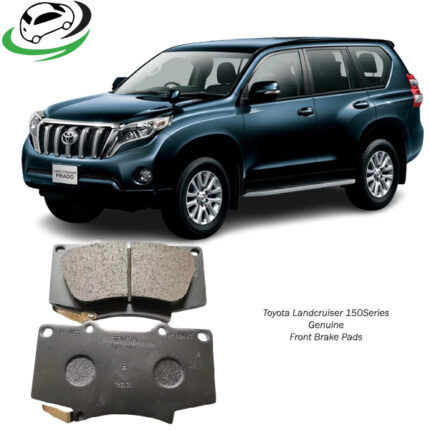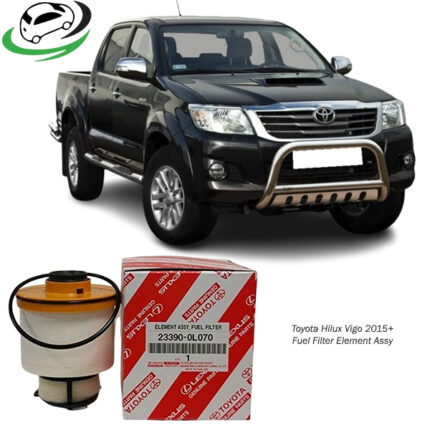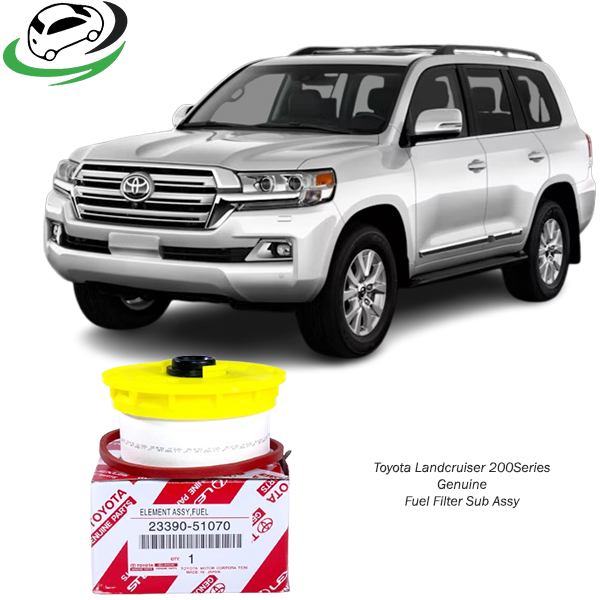-6%
Get Toyota Landcruiser 200 Series Genuine Fuel Filter Sub Assy 23390-51070
The fuel system in any vehicle plays a crucial role in ensuring the efficient operation of the engine. Among its essential components is the fuel filter, responsible for purifying the fuel before it enters the engine. A fuel filter sub assembly is a high-quality, OEM (Original Equipment Manufacturer) component that guarantees optimal performance and protection for your vehicle’s engine. Using genuine fuel filters ensures that the engine receives clean fuel, free from contaminants, which contributes to smooth operation, increased longevity, and improved fuel efficiency.
In this detailed guide, we will cover the purpose of a fuel filter sub assembly, its components, the advantages of using genuine fuel filters, types of fuel filters, signs of a failing fuel filter, maintenance practices, and the importance of timely replacement.
1. Purpose of a Fuel Filter Sub Assembly
A fuel filter sub assembly’s primary purpose is to remove contaminants, such as dirt, rust, and debris, from the fuel before it reaches the fuel injectors and the engine. Over time, fuel can pick up impurities from storage tanks, fuel lines, and even the environment. Without a functional fuel filter, these contaminants could cause significant damage to the engine, fuel injectors, and other critical components.
Here’s how it works:
- Fuel enters the filter: As fuel is pumped from the fuel tank to the engine, it first passes through the fuel filter.
- Filtration process: The filter element traps particles and impurities while allowing clean fuel to flow through.
- Clean fuel to the engine: After filtration, the clean fuel proceeds to the fuel injectors or carburetor, where it is mixed with air and ignited in the combustion chamber.
By ensuring only clean fuel reaches the engine, the fuel filter sub assembly helps maintain optimal performance, prevents wear and tear, and reduces the risk of costly repairs.
2. Components of a Genuine Fuel Filter Sub Assembly
A fuel filter sub assembly consists of several parts, each designed to enhance the filtration process and ensure a reliable flow of clean fuel to the engine. Common components include:
a. Filter Housing:
The filter housing encases the filter element and provides protection from the external environment. It is often made from metal or durable plastic to withstand high pressure and prevent damage.
b. Filter Element:
This is the core component of the fuel filter sub assembly. The filter element is typically made from a combination of paper, synthetic fibers, or mesh material. Its design allows it to trap microscopic particles, rust, dirt, and debris while permitting clean fuel to pass through.
c. Seals and Gaskets:
The seals and gaskets ensure a tight, leak-free fit between the fuel filter and the fuel lines. They help maintain pressure within the system and prevent fuel from leaking out or contaminants from entering.
d. Inlet and Outlet Ports:
These are the entry and exit points for the fuel. The inlet port receives fuel from the fuel tank, while the outlet port delivers filtered fuel to the fuel injectors or carburetor.
e. Mounting Brackets (Optional):
Some fuel filter sub assemblies come with mounting brackets or clamps to secure the filter in place within the fuel system. This ensures stability, especially in vehicles that experience vibrations during operation.
3. Advantages of Using a Genuine Fuel Filter Sub Assembly
Using a genuine fuel filter sub assembly offers several advantages over cheaper, aftermarket alternatives. Here’s why you should always opt for genuine parts:
a. Precise Fit and Compatibility:
Genuine fuel filters are designed specifically for your vehicle’s make and model, ensuring a perfect fit. This reduces the risk of installation issues, leaks, or poor performance. OEM filters are rigorously tested to meet the manufacturer’s specifications.
b. Superior Filtration:
Genuine fuel filters use high-quality filter media that can trap even the smallest particles and contaminants. This ensures that only the cleanest fuel reaches your engine, which is essential for preventing clogs, injector damage, and poor engine performance.
c. Durability and Longevity:
OEM fuel filters are built to last, with superior materials and construction techniques that make them more resistant to wear and tear. This durability ensures that the filter can withstand high pressures and extended use without breaking down or becoming clogged prematurely.
d. Optimal Fuel Flow:
Genuine fuel filters are designed to maintain the proper flow rate of fuel to the engine, which is crucial for maintaining performance, especially during demanding driving conditions. Aftermarket filters may restrict fuel flow, leading to reduced engine efficiency and power.
e. Warranty Protection:
Using genuine parts helps maintain your vehicle’s warranty. Installing aftermarket or non-OEM parts may void the warranty, leading to costly repairs that aren’t covered by the manufacturer.
f. Improved Fuel Efficiency and Engine Performance:
Clean fuel is essential for optimal combustion in the engine. A genuine fuel filter ensures that the fuel delivered to the engine is free from contaminants, which improves combustion efficiency, enhances fuel economy, and reduces emissions.
4. Types of Fuel Filters
There are various types of fuel filters, each designed for specific fuel systems and vehicle configurations. Understanding the different types can help you select the correct one for your vehicle.
a. Inline Fuel Filters:
Inline filters are installed directly in the fuel line, typically between the fuel tank and the fuel injectors. These filters are often easy to replace and are common in many vehicles.
b. Cartridge Fuel Filters:
Cartridge filters consist of a replaceable filter element housed within a metal or plastic casing. They are commonly found in diesel engines, where filtration needs are more stringent.
c. Spin-On Fuel Filters:
Spin-on filters are similar to oil filters in design. They feature a metal housing with an integrated filter element that can be easily replaced by unscrewing the old filter and screwing on a new one.
d. In-Tank Fuel Filters:
In-tank fuel filters are located inside the fuel tank, often integrated with the fuel pump assembly. While these filters are more difficult to access, they are essential for preventing debris from entering the fuel pump and damaging the fuel system.
e. Diesel Fuel Filters:
Diesel engines require specialized filters to handle the unique properties of diesel fuel, including the ability to separate water from the fuel. These filters often feature additional elements such as water separators to prevent water from entering the engine.
5. Signs of a Failing Fuel Filter
A clogged or failing fuel filter can lead to various performance issues and even engine damage if left unaddressed. Here are some common symptoms of a bad fuel filter:
a. Engine Misfires or Hesitation:
A clogged fuel filter restricts the flow of fuel to the engine, which can cause it to misfire or hesitate during acceleration. This is especially noticeable when the vehicle is under load, such as when climbing a hill or towing.
b. Poor Fuel Efficiency:
If the fuel filter is partially clogged, the engine may struggle to receive the proper amount of fuel, leading to inefficient combustion. As a result, you may notice a drop in fuel efficiency and more frequent trips to the gas station.
c. Difficulty Starting the Engine:
A severely clogged fuel filter can prevent fuel from reaching the engine, making it difficult to start the vehicle. In some cases, the engine may crank but fail to start altogether.
d. Stalling or Sudden Power Loss:
If the fuel filter becomes completely blocked, the engine may stall or lose power while driving. This can be dangerous, especially if it happens at high speeds or in heavy traffic.
e. Check Engine Light:
In some modern vehicles, a failing fuel filter can trigger the check engine light. This is often due to sensors detecting insufficient fuel pressure or other fuel system-related issues.
6. Maintenance and Replacement of Fuel Filters
To ensure the longevity and reliability of your vehicle’s fuel system, it’s important to replace the fuel filter at regular intervals. Here are some key maintenance tips:
a. Follow the Manufacturer’s Schedule:
Consult your vehicle’s owner’s manual for the recommended fuel filter replacement interval. Most manufacturers recommend replacing the fuel filter every 20,000 to 40,000 miles, though this can vary depending on driving conditions.
b. Use Genuine Fuel Filters:
As mentioned earlier, always opt for genuine OEM fuel filters to ensure the best performance and compatibility with your vehicle.
c. Inspect for Contaminants:
During fuel filter replacement, inspect the old filter for signs of excessive dirt, rust, or debris. If the filter is particularly clogged, it may indicate a problem with the fuel supply or tank that needs to be addressed.
d. Check Fuel Lines for Leaks:
When replacing the fuel filter, inspect the fuel lines for any signs of leaks or damage. Damaged fuel lines can introduce contaminants into the system and cause further issues.
e. Regularly Maintain the Fuel System:
In addition to replacing the fuel filter, it’s important to maintain the entire fuel system by using high-quality fuel, avoiding contaminated fuel sources, and using fuel additives if recommended by the manufacturer.
Conclusion
A genuine fuel filter sub assembly is essential for maintaining the health and performance of your vehicle’s engine. By filtering out harmful contaminants from the fuel, the filter protects critical components such as the fuel injectors and combustion chambers, ensuring smooth engine operation, better fuel efficiency, and longer engine life. Regular maintenance, timely replacement, and the use of genuine OEM filters are key to keeping your vehicle running at its best.
Follow us on Facebook for more parts.




Reviews
Clear filtersThere are no reviews yet.